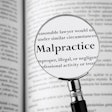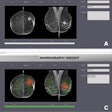The Death of Mammography by René Jackson and Alberto Righi
Caveat Press, Ashland, OR, 2006, $19.95
The current medical liability crisis endangers not just mammography, but every aspect of clinical care. The Death of Mammography by Rene Jackson and Alberto Righi provides an explanation of the nature of this litigation crisis in the U.S. and its detrimental effect on access to care.
The authors describe the pathology, diagnosis, and treatment of breast cancer in language that allows non-medical experts to understand the concepts. The rationale and controversies of breast cancer screening, and the biases associated with screening, are visited, but with the emphatic conclusion that screening does indeed save lives.
The authors go to some length to explain the fallibility of mammography, the errors of perception, the important concept of hindsight bias, and the economic cost of defensive medicine. The authors are quick to point out, however, that despite its limitations, mammography remains the single best test for the early detection of breast cancer.
Every chapter begins with a narrative that follows a real-life court case. The increasingly familiarly scenario involves a radiologist being sued for not following an area of asymmetry in a patient's mammogram, with the woman later developing breast cancer. As the story unfolds, the suspense builds up to the jury’s verdict. The reader cannot help but feel sympathetic for the defendant radiologist whose professional confidence and belief in the special doctor-patient relationship is severely eroded.
The authors make a candid assertion that the malpractice crisis is economically driven. This cycle is perpetuated by trial lawyers' associations that donate money to politicians who oppose tort reforms, according to Jackson and Righi. The ethics and integrity of the plaintiffs' expert witnesses is also questioned. However, there is no commentary in the book from expert witnesses in which they address accusations of inaccurate testimonies because of financial motivation. This makes the authors' arguments one-sided.
Overall, The Death of Mammography is eminently readable with an appropriate balance of fact and opinions. The radiologist is certain to be humbled by the imperfection of imaging and find him or herself feeling empathetic to a colleague that has been involved in a medical lawsuit.
By Saurabh JhaAuntMinnie.com contributing writer
January 24, 2006
Dr. Jha is a fourth year resident in diagnostic radiology at the Hospital of the University of Pennsylvania in Philadelphia. Upon completing residency in June 2006, Jha will pursue a fellowship in cardiovascular imaging.
The opinions expressed in this review are those of the author, and do not necessarily reflect the views of AuntMinnie.com.
Copyright © 2006 AuntMinnie.com















